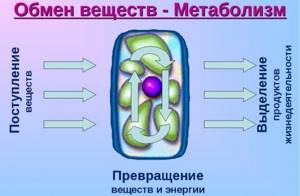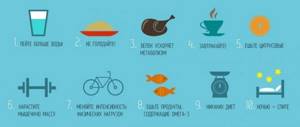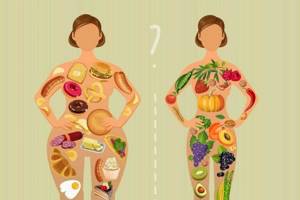Metabolism is the conversion of calories into work. With a slow metabolism, a person performs the same functions as a person with a fast metabolism, but the former spends fewer calories on it. The faster your metabolism, the easier it is to lose weight.
Like 0
2561
Your body adjusts to changes in your life, including your calorie intake and energy expenditure. This is called metabolic adaptation - a mechanism that regulates a number of processes associated with human nutrition. The main task of this mechanism is to provide the body with energy during periods when there is not enough nutrition. Vivid examples of the operation of this mechanism can be situations when a person went alone into the forest, mountains, got lost there and lived for several weeks without food. The body, being in a stressful situation, began to adapt to the lack of food, slowing down metabolism and, as a result, energy consumption. Slow metabolism has repeatedly saved climbers and lovers of recreation in wild conditions. But if you want to lose a few pounds, a slow metabolism will clearly complicate the weight loss process.
What is metabolism?
The reasons for slow metabolism can be different. The rate of calorie burning depends on physical activity, gender, body type, nutrition and genetic predisposition and other factors. All metabolic processes in the body occur at the cellular level. Cellular metabolism is the reactions that occur in the body to convert energy, consume nutrients and other processes. Cellular metabolism adapts to the state of the external and internal environment and adjusts to the body’s costs. Energy is extracted from cells, and if a person spends little of it, then substances accumulate at the cellular level. Metabolism in the body exists in 2 forms: assimilation and dissimilation. The causes of metabolic disorders depend on physical activity, proper rest and proper nutrition. There are two types of metabolism: catabolism and anabolism. Catabolism provides energy to cells during physical activity. When eating food, organic substances are released, molecules are broken down, and digestive products break down. Anabolism occurs in the body to grow muscle mass and increase physical activity. The failure of metabolic processes lies in the accumulation of calories in the body, which are released when food is broken down.

Metabolism concept
Energy expenditure consists of burning calories. If a person does not expend energy, it accumulates in the body in the form of fat deposits, which affects weight. Energy is consumed in 3 stages:
- The basal metabolic rate is the number of calories the body uses to maintain life. This stage is where the basic release of energy occurs.
- The average metabolic rate is the energy spent on maintaining fine motor skills of the hands, speech, thinking and other physiological processes.
- A low metabolic rate is the production of heat to maintain normal body temperature. Digestion, assimilation and absorption of food and thermogenesis also occur at this stage.
Metabolism is a complex process that includes many stages. A decrease in metabolic rate negatively affects the entire body, which is why there is a deterioration in all processes and weight gain.
Under what conditions does metabolism slow down?
In case of an excessive decrease in the daily calorie intake (less than 1100 kcal) or a sudden transition from a high number to a low one (from 3000 kcal per day to 1500 kcal daily). For example, if you previously consumed about 3,500 kcal daily, and then suddenly switched to a diet with a norm of 1,800 kcal, then the body will have to adapt. Of course, one day will not be enough to change the functioning of the entire body, but 4-6 weeks is enough. At the same time, during these 6 or more weeks you lead a sedentary lifestyle or even perform light aerobic exercises.
- 162
More details - 198 192
More details
- 1211 1092
More details
- 222
More details
The body begins to adapt to the situation in which it finds itself. By slowing down the metabolic rate, it makes up for the lack of food or energy. The result is that you start eating less and even if you add exercise or increase the activity of your workout, the fat still remains with you. Your workouts become even more intense, and the number of daily calories consumed is even less, but the result is still not there. This is called the plateau effect
, in which reducing calories does not produce results. If you find yourself in this situation, you should reconsider your food system.
When metabolism is slow, the following processes occur:
- muscle atrophy develops (muscles decrease and the amount of fat increases);
- the production of thyroid hormones decreases;
- the level of energy required for physical activity decreases;
- fat burning is reduced;
- the feeling of hunger haunts you more and more often.
Causes of decreased metabolism?
The causes of metabolic disorders lie in age-related changes, therefore, if in youth there is a rapid metabolism, as people lead an active lifestyle, then with age there is a decrease in it due to the appearance of chronic diseases, impaired motor activity and irregular nutrition. All this causes low calorie expenditure, which causes fat cells to accumulate in the body and excess weight to appear. There are different reasons for a decrease in metabolic rate:
- violation of diet and consumption of unhealthy foods;
- sharp weight loss and reduction in caloric content of foods;
- hormonal imbalances and genetic predisposition;
- acute and chronic intestinal diseases;
- lack of fiber in the diet;
- lack of vitamins;
- violation of drinking balance;
- impaired absorption of nutrients;
- sedentary lifestyle;
- lack of sleep.

Lack of sleep can slow down your metabolism
Even with age-related changes, people can control their weight and regulate metabolic processes. Older people need to speed up their metabolism and do more physical activity to maintain a healthy weight. But if you suddenly switch to low-calorie foods, this can have a bad effect on the body, and instead of losing weight, a person can gain weight.
Read
About fasting and its effect on hormones
Causes of Slow Metabolism
There are biological reasons why metabolism slows down:
- Protein imbalance. They are involved in the absorption of substances by the body. Protein metabolism requires 20 types of amino acids supplied with food. The normal process is disrupted even if just one is missing. The volume of incoming and destroyed protein is determined by the nitrogen balance. Negative is observed with its deficiency or the presence of certain diseases.
- Carbohydrates are also important compounds. They are the main energy source. Carbohydrates are divided into “fast”, which are absorbed immediately, and “slow”. An incorrect ratio (deficiency or excess) disrupts metabolic processes. When you consume too many carbohydrates, a lot of glucose appears, and the excess sugar is stored in fat.
- Fats (lipids) are complex compounds that consist of esters, glycerol and some types of acids. Together with them, vitamins enter the body. With a lack of fat, metabolism slows down, endurance and brain activity decrease.
- Water-salt exchange. It is very important for proper metabolism. Water is needed for biosynthesis, digestion, blood circulation, etc. With it, the body receives mineral components necessary for the functioning of all organs and systems. Even a slight disturbance of the water-salt balance leads to a slowdown in metabolic processes.
In addition to the listed reasons that slow down metabolism, there are other factors (usually several of them at once) that “slow down” metabolism:
- Age. As you get older, your metabolic rate decreases.
- Fiber deficiency.
- Floor. Men have a more intense metabolism than women due to more muscle mass.
- Constant stress.
- Body volumes. The more obese a person is, the more calories need to be burned.
- Lack of sleep.
- Physical exercise. A sedentary lifestyle slows down your metabolism, while an active lifestyle speeds it up. But in the second case, physical activity must be moderate, otherwise a lot of oxygen enters the tissues, which increases cell activity and slows down metabolism.
- Any pathologies of the gastrointestinal tract.
- Air temperature. The hotter and warmer it is, the lower the energy consumption, and the metabolism slows down.
- Genetic predisposition.
- Strict and low-calorie diets. The body begins to save resources, store fats for a “rainy day,” defining the situation as the onset of famine.
- Insufficient water intake.
- Refusal of breakfast, unbalanced diet, not many people remember that they slow down metabolism. In the morning, the body needs to actively launch metabolic processes, but this is hampered by the lack of food. As a result, metabolism slows down. Even if you eat the right amount of calories during lunch, you won’t be able to burn them off until the night. The body perceives quick snacks, eating 1-2 times a day as a possible and imminent onset of hunger and begins to store fat. If food arrives at approximately the same time, after 2-3 hours, then there will be no reason to panic. The body will quietly process food all day and rest at night.
- Deficiency of calcium, magnesium and other elements.
It is worth highlighting a list of foods that slow down metabolism:
- sweet;
- potato;
- eggplant;
- sausages and sausages;
- butter;
- pickles, marinades, spicy and fatty foods;
- alcohol;
- fatty meat and fish;
- flour products;
- mayonnaise;
- fast food and semi-finished products;
- lard, smoked meats;
- pork;
- cereal crops.
Hormonal imbalances (see). Metabolic rate depends on leptin and thyroxine. If there are few of them in the blood, the metabolism slows down. This usually accompanies type 2 diabetes.
Signs of a slow metabolism
Problems with slowing down metabolic processes can arise at any age and with any lifestyle. Disorders do not appear immediately, but gradually, since the body must adapt to new conditions before gaining weight. An accelerated metabolism helps keep the body in shape, so as you age, in order not to gain weight, you need to listen to your body in order to notice changes in a timely manner and prevent more serious disorders. The main signs of metabolic disorders:
- disruption of digestive processes;
- unstable weight: sudden weight gain and loss;
- deterioration of skin, hair and nails;
- menstruation disorders in women;
- dysfunction of the liver and kidneys;
- hormonal disorders;
- difficulties in losing weight;
- the appearance of chronic fatigue syndrome;
- decreased performance;
- chronic drowsiness;
- exacerbation of chronic diseases.

Ways to speed up metabolism
The above signs may be a signal of a decrease in the speed of metabolic processes and a signal of serious disorders, so these symptoms cannot be ignored.
How to tell if your metabolism is slow
In order to understand that something is not working correctly in the body, it is not necessary to go to the doctor. It is enough to carry out a few tests at home.

It is necessary to pay attention to the following points:
- waist size – for men it should be less than 100 centimeters, for women less than 85;
- Blood pressure readings should not be higher than 130/85 mm. Hg Art.;
- blood sugar level. If the fasting indicator is more than 6.1, then the metabolic process in the body is slow;
- triglyceride levels.
If at least one of the indicators is not normal, you should definitely visit an endocrinologist and undergo the required examinations. Afterwards, the doctor will prescribe treatment that will help speed up the metabolic process in the body.
Important!
Most often, women suffer from metabolic disorders. As a result, no matter what a person does to lose weight, he will not be able to do this.

Typically, metabolism decreases as a person begins to age. That is why after the age of 40 it is quite difficult to put the body in order. But despite this, you should not give up. Experts offer tips that can help you lose weight even if your metabolism is slow.











